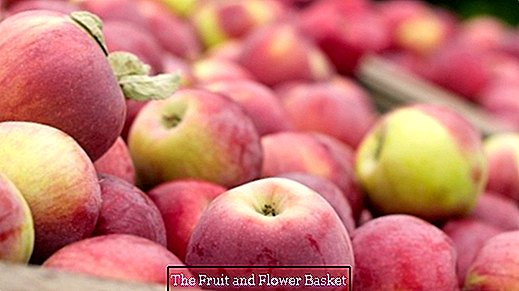Apples? How healthy are they really?
"An apple a day keeps the doctor away !? Come on ? does a text about apples really have to start with this clichéd phrase? Original is probably different. On the other hand, I have already ticked off the probably most famous of all apple wisdoms and can turn to the facts. And also my shameless use of the (in TheFruitAndFlowerBasket not always like read) English language right in the first sentence, I can explain: This bulge is actually only in English, at least if the winged word is to rhyme. "An apple a day keeps the doctor away !? How official German boring sounds that, please? But enough of it. Let's keep it a secret: the popular saying goes on to say that the daily consumption of an apple is incredibly healthy. Let's see what's really up to this thesis.
The apple: ingredients and their effects
Of the approximately 20,000 different apple varieties worldwide, around 1,000 are also cultivated in Germany. However, this obvious abundance is only used to a limited extent: 70 per cent of European apple consumption is covered by the four most common varieties alone. In addition to the approximately 17 kilograms of apples, which every German consumes statistically a year, a good 11 liters of apple juice are added as a healthy thirst quencher.
The apple is a true treasure box, filled with valuable ingredients. In pulp and peel of an average sized apple are included:
- about 30 vitamins and trace elements, especially the Provitamin A as well as the Vitamins B1, B2, B6, E and C
- 100 to 180 milligrams of Minerals potassium, phosphorus, calcium, magnesium and iron
- 85 percent water - therefore only about 60 kilocalories
- pectin - lowers cholesterol and binds pollutants in the body
- phytochemicals, so-called catechinsthat may reduce the risk of lung and bronchial diseases
- Flavonoids and carotenoids Allegedly lower the risk of cancer and have an antioxidant effect in the human organism
- roughage have a positive effect on intestinal activity and digestion
If you take the high-hanging bar of currently hyped superfood representatives as a standard, the apple performs in direct comparison above average. And in contrast to the often well-traveled chia seeds or goji berries, most apples come from regional cultivation? This saves long transport routes and the associated environmental impact.
Very important: over 70 percent of the vitamins and nutrients contained in the apple are in the shell, or directly below it. Therefore: Only an unpeeled apple is also a full-fledged apple.
The study to the apple saying
As with almost every topic, there is, of course, a study in this case as well, which includes the proverb mentioned above "An apple a day keeps the doctor away !? takes a closer look under the scientific microscope. The study was published in English and is titled Association Between Apple Consumption and Physician Visits?, which means about as much as German: The connection between apple consumption and doctor visits. To read the study results are here: study to the apple proverb
I have taken the reading and translation from you and summarize briefly once: The basis of the study is the data of doctor visits of 8399 adults. About 9 percent of the volunteers had stated in advance to eat at least one small apple daily (minimum 149 grams). The analysis of the data has shown that there are no significant differences in the frequency of visits to the doctor between the apple eaters and the non-eaten eaters. But: The apple eaters usually have a higher education, smoke fewer cigarettes and have less prescription drugs. The daily apple can not replace the visit to the doctor (which would have been too good), but overall seems to have a slightly positive effect on health in general.
Incidentally, the proverb first appeared in a medical publication in 1866, but at that time it had the following slightly altered wording: Eat an apple on going to bed and you? Ll keep the doctor from earning his bread. The Google Translator translates this as follows: "Eat an apple when you go to bed and you will stop the doctor from making his bread." Of course, this raises new questions in the matter of evening dental hygiene, but is another topic.
The apple in the historical context
For all those of the topic? Apples? can not get enough, is there a few more or less verifiable facts from the long history of the vitamin bomb with the apple cheeks?
The first documented contact between man and apple is already described in the Old Testament (Genesis, chapter 3). Instigated by the serpent, Eve eats an apple from the forbidden tree of knowledge.The amazing thing about it: Although biting into the apple heralded the expulsion of Adam and Eve from Paradise, the sympathetic pome fruit did not suffer any lasting damage to its image.
Another noteworthy starring role is played by the apple in the study of gravity by the British physicist Isaac Newton (1643-1727). According to the legend, Newton is said to have taken a long nap under an apple tree. During this creative break, a ripe apple fell on his head, giving Newton his aura of gravity. At times even scientists like to believe in a fairytale.
Literary celebrity attained an apple in the stage work? William Tell? of the German playwright Friedrich Schiller (1759? 1805). There, the Swiss freedom fighter Tell shoots his son an apple with the crossbow from his head. Such faxing, which endangers the interest of the child, would call the youth welfare office today, but at the time seemed to be one of the easiest exercises of a freedom fighter. Fortunately for the boy, it was none of the only about as marble sized cherry apples from the Asian region (Malus baccata). Buy now  LEMCASE apple slicer, apple peeler - apple slicer - fruit slicer made of silicone handle | Blue (2 pieces? 18.99? 11,94 ?
LEMCASE apple slicer, apple peeler - apple slicer - fruit slicer made of silicone handle | Blue (2 pieces? 18.99? 11,94 ?





